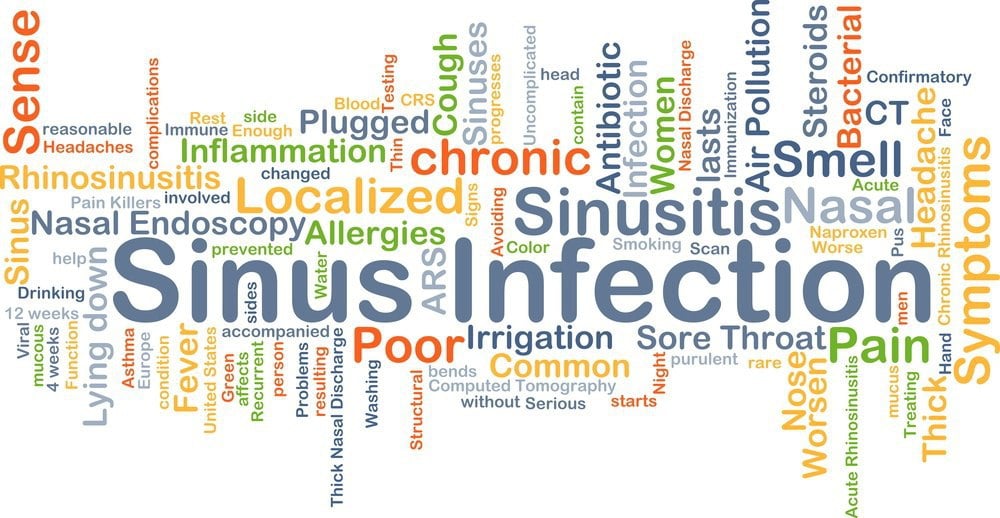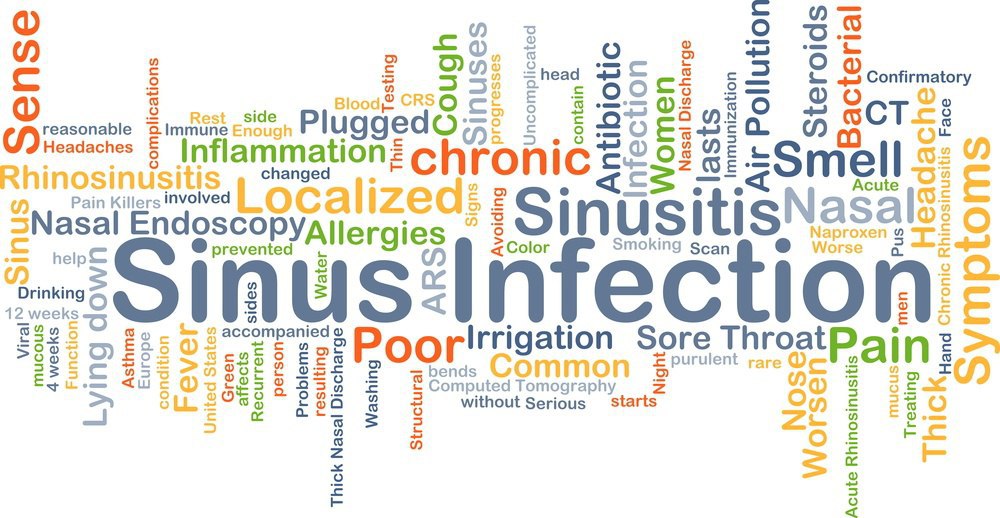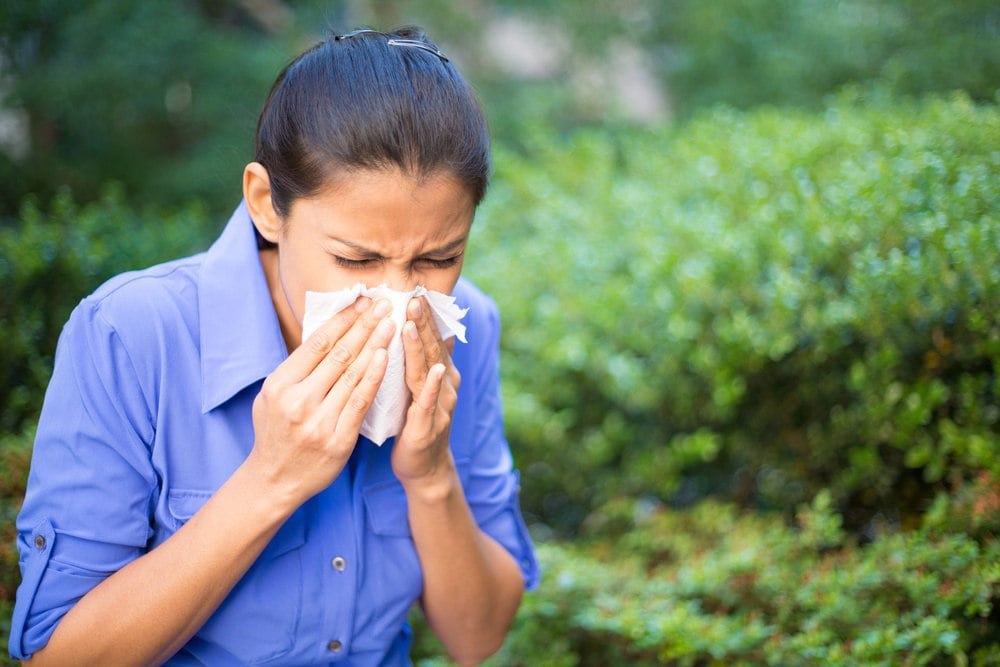What is a Sinus Infection? (Signs and Symptoms)
May 16th, 2017 | 4 min. read


In some parts of the country where allergies are a common complaint, like Houston, signs of a sinus infection may be overlooked. Actually, it is often difficult to recognize distinct symptoms of sinus infection when everyone around you is suffering from sniffles, sneezes, watery eyes, headaches, congestion and scratchy throats, whether it's due to pollen or the annual cold and flu season.
The sinuses are a human network of passages that run behind the nose and above and below the eyes. Any or all of them may become inflamed and swollen, leading to facial pain, nasal discharge, overall stuffiness and lessened ability to smell or taste. Your throat might hurt or you may sound hoarse. All tallied, the signs of a sinus infection are not fun!
Some people are prone to recurrent sinus infections; others suffer an acute attack which often clears quickly and with no specific treatment. If you experience severe pain, extreme congestion or minor symptoms that last longer than a week or so or recur over a period of 12 weeks or more, you should by all means seek medical attention.
When to Suspect a Sinus Infection

How do you know if you have a sinus infection? The best way, of course, is to see a doctor. Because there are a wide variety of sinus infection symptoms and they may mimic the signs of other respiratory illness or seasonal allergies, the best way to be certain is to pay a visit to your doctor. However, first put on your detective hat and check for the following common signs. If you have a cold, you can also have an accompanying sinus infection, but they both should clear within a week.
Here are the most common complaints:
- Dull Pain: It can radiate from one or both sides of your nose, extend to the middle of your head between your eyes, or appear as dagger-like flashes along your upper jaw and teeth. You may only feel a kind of generalized pressure in your face and head, and it may feel worse when lying down, or when you first get up in the morning.
- Congestion: Swollen nasal passages make it difficult to breathe, and if the inflammation is combined with any kind of discharge, a sinus infection causes a lot of discomfort.
- Nasal Discharge: There are only two ways to eliminate nasal discharge: by blowing your nose, or by allowing it to drain down the throat. Either can be problematic. If the mucous is thick, cloudy, or tends toward green or yellow, you most likely have a sinus infection. It's time to call your doctor.
- Cough: Whether you experience just a dry tickle or a persistent and annoying cough, it is caused by the throat irritation that results from sinus passages that drip along the back of your throat.
- Hoarseness: Postnasal drip causes irritation and, if allowed to continue, it usually gets worse.
- Sore Throat: A raw throat can mean difficulty swallowing, speaking or even breathing, especially cold or dry air. If any sore ness persists more than a few days, or worsens, have it checked.
- Inability to Sleep: The symptoms of a sinus infection seem more noticeable when lying prone. If you have difficulty sleeping, try to prop your upper body and head with additional pillows.
- Loss of Appetite: It's not unusual to lose your appetite if you have a cough, a sore throat or generalized aches. If symptoms don't abate within a few days, try to take some action to counteract the symptoms. In this case it's okay to self-medicate with a nasal spray, to suck on a throat lozenge, or to take recommended medication.
- Headache: Try to rest and remain calm; take an OTC headache medication, if appropriate.
- Fever: Elevated temperatures are not common with sinus infections, but if you are running a fever and you also have several of the above symptoms, don't hesitate to call your doctor. The signs may point to another, more serious problem, or you may have developed a bacterial infection that will respond to antibiotics.
Sinus Infection 101
While sinus infections are not normally considered serious, they can be hard to diagnose because the symptoms are so similar to allergies and the common cold.
Are sinus infections contagious? Yes, like the common cold, the virus can be transmitted to other people. The respiratory virus is most often spread through hand-to-hand contact. If you  suspect that you or a family member has a sinus infection, be especially vigilant about washing hands, properly disposing of tissues and not sharing drinks or food.
suspect that you or a family member has a sinus infection, be especially vigilant about washing hands, properly disposing of tissues and not sharing drinks or food.
Most commonly caused by a virus, sinus problems tend to persist after specific allergic reactions or cold symptoms disappear. Short-term sinus infections that clear spontaneously can often be relieved by treatment with antihistamines and decongestants. These acute flare-ups frequently are no more worrisome or uncomfortable than the common cold. Chronic infections, however, persist over many days, sometimes for weeks, recur frequently, and might require medical intervention. The effect of a chronic infection is not only uncomfortable but can be debilitating in much the same way as migraine headaches or other swelling and inflammation.
Sinus infection can be caused by bacteria, and occasionally by fungus, and sometimes are precipitated or complicated by nasal polyps or tooth problems. Your physician might recommend an antibiotic or prescription steroid in order to prevent a secondary, more serious infection. If you experience severe pain, or symptoms become progressively worse, it's wise to schedule an appointment with a specialist.
Sinus Infection Treatment Options
While there are effective over-the-counter medications to alleviate the discomfort of nasal infections, prolonged treatment with nasal sprays, decongestants and antihistamines is not the best idea. Remember that some common medications are not recommended for people with high blood pressure, glaucoma or prostate problems. Certain OTC medications also interfere with drugs prescribed for chronic conditions, including rheumatoid arthritis and other immune system disorders.
Your doctor is your best source of information and treatment, especially if your symptoms recur regularly or return within a period of days or weeks. Consulting an allergist is a logical second step if your primary care physician concurs and the signs point to an allergic trigger for your sinus problems.
There are also some herbal remedies that have proven effective in alleviating symptoms. At the very least, if you're inclined to try natural-based remedies, explore the options with your doctor. Even though most medical professionals will warn you against mixing the preparations yourself, herbal mixtures are regularly used in Europe and results have been verified for both acute and chronic infections.
Sinus irrigation and nasal rinses are also commonly recommended, but you should begin them only with professional guidance and monitoring.
Children and Sinus Infections
Unfortunately, there is no age minimum for sinus infections, and they are more difficult to detect and diagnose in children. As with adult cases, be suspicious if a runny nose or a cough lasts more than a couple of days, if a child seems lethargic, stops eating or drinking, sleeps restlessly or complains of frequent headaches.
Teach your children the benefits of proper hygiene and be prudent during flu and cold season and watchful when the pollen count or pollution index are high. As with other respiratory problems, the sinuses can be affected by environmental factors, by smoke and sometimes by strong odors.
Armed with a normal measure of knowledge and concern, you should feel confident in your ability to deal with the signs and symptoms of sinus infections, and to find effective advice and treatment if you suspect that's what ails you or your family.
Contact Houston ENT today at (281) 649-7000 if you feel you or a loved one is suffering from a sinus infection!
Click the eBook below to get your FREE eBook today for more information on Sinus Infections, Allergies, Sinusitis and the Balloon Sinuplasty.
Dr. Suchanova is a Diplomate of the American Board of Otolaryngology Head and Neck Surgery and a Fellow of the American Academy of Otolaryngology Head and Neck Surgery. She is fluent in English, Czech, Slovak and conversational in Spanish.
Topics:

